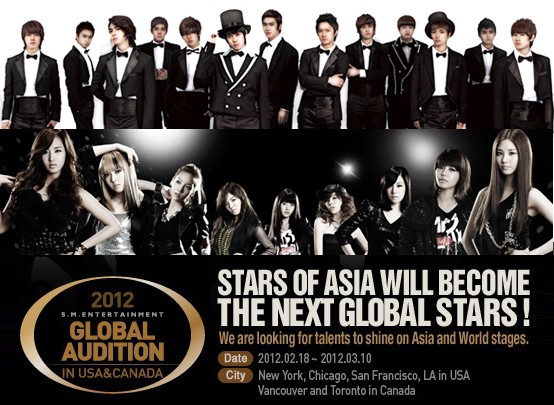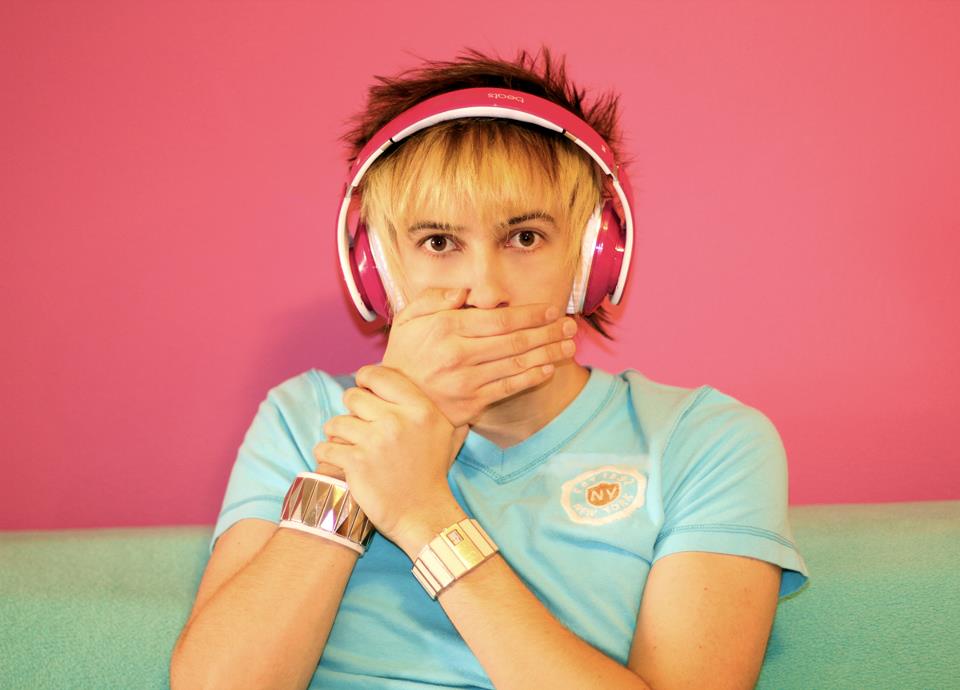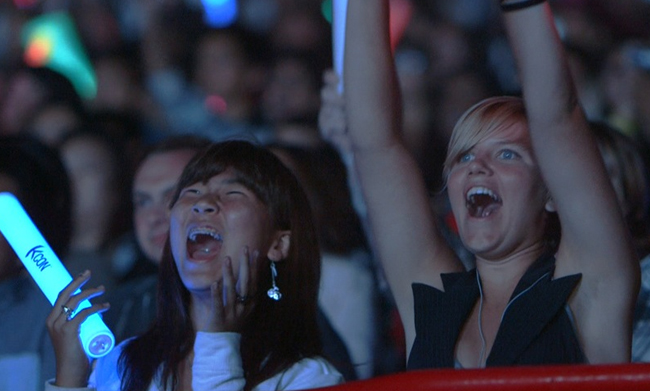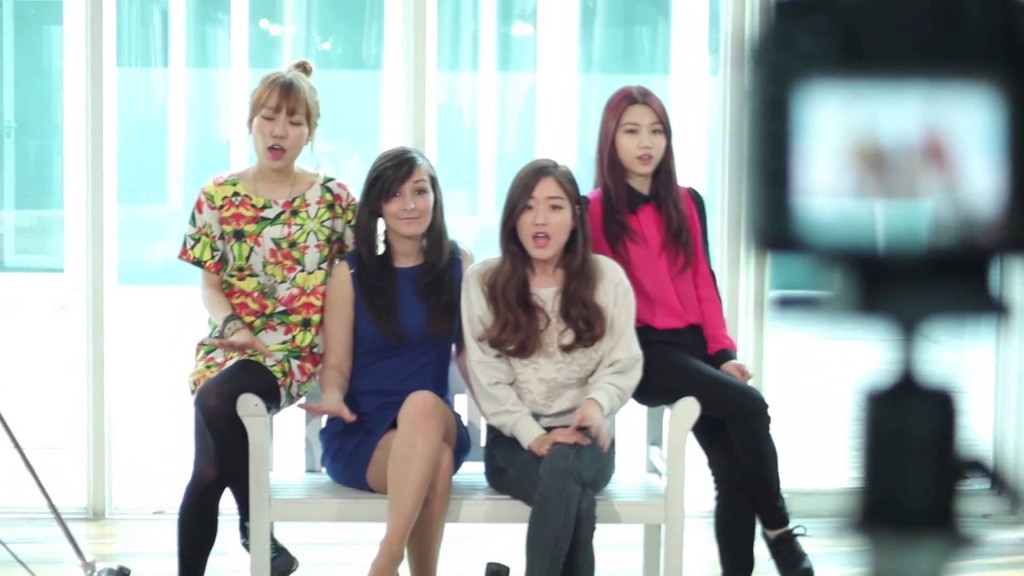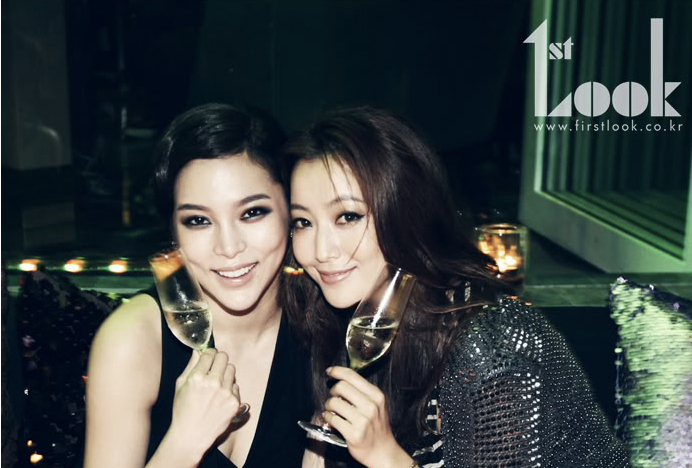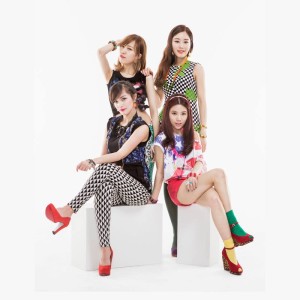 So what happens when theories become reality?
So what happens when theories become reality?
A new girl group called The Gloss just announced their impending debut a few days ago. Not much is known about The Gloss or their management, but we do know that they are being touted as an “international group” with four members: Grace, a Korean-American hailing from Chicago; Liz and Sol-E from Korea, and Olivia from France.
From their teaser picture, The Gloss looks like another run-of-the-mill K-pop girl group in funky leggings and dyed hair. But if you squint a little bit, you might notice that there’s one member who is a little different. And she’s a little different because she’s…not Asian.
Wait, a non-Asian in a K-pop group?! Wow, looks like K-pop has finally learned let go of their nationalistic streak and is beginning to embrace multiculturalism by allowing foreigners to become K-pop idols! I mean, it sure took them long enough, right? Stop the presses! Break out the champagne! Let’s throw a party!
Except…let’s not.
About a year and a half ago I wrote a piece on SM’s global auditions and the controversy surrounding the idea that the only people with a real shot at achieving K-pop stardom were East Asians. Korean entertainment companies have been holding overseas auditions for quite some time now, but even after all these years, the dearth of non-East Asian faces on the K-pop stage essentially speaks for itself.
As I explained in my previous article, the reasoning behind favoring East Asians over any other race makes a lot of sense when one considers the ways in which K-pop has been marketed for the past ten years. As much as K-pop has recently grown to become a global phenomenon, there is still little doubt in the fact that K-pop is still recognized as an Asian music scene with Asian performers, and that the bulk of the K-pop fan market lies within Asia. Thus, Korean entertainment companies are completely justified in favoring people of East Asian descent when choosing potential trainees. It’s not because Korean entertainment companies are exercising their racism muscles when they favor East Asian recruits; it’s because that’s the way K-pop has worked for the past decade or so, and it still works pretty well today.
As aforementioned, however, it would be foolish to ignore K-pop’s rapid spread outside of Asia over the past couple of years. Now more than ever, Hallyu has become an important facet of the Korean political and economic identity, and Western purveyors of K-pop are the next players up at bat. With Western fans consuming more K-pop than ever before, the next logical step might be to begin casting Westerners as K-pop idols.
But the sight of a European face in an otherwise all-Asian K-pop group is bound to come off as a surprise to almost anyone who notices this irregularity. Some are excited at the prospect of seeing a non-Asian on the K-pop stage. Others are uncomfortable with it, though many might not be able to put their finger on why. In any case, though, there’s something about seeing Olivia in The Gloss that catches our attention in a way that forces us to think about the implications of having a non-East Asian as a Korean pop idol.
After all, Olivia is the first non-Asian K-pop idol group member, and the first of anything is always bound to stir up some curiosity and controversy. The same could be said about Hangeng when he became the first non-Korean idol to debut in Korea; his placement in Super Junior drew a considerable amount of media attention to the entire group, and his Chineseness was highlighted at almost every possible opportunity. But in the end, things mellowed out and Hangeng was eventually regarded as just another Super Junior member instead of the strange kid from China wearing the mask during music broadcasts. Should the debut of the first white K-pop girl group member be treated with the same regard as the debut of the first Chinese K-pop idol?
Well, if we’re working under the assumptions that Olivia has no ulterior motives in being a K-pop star apart from the chance to pursue her passion of performing and entertaining, and if we’re talking in purely objective terms of shoulds and should-nots, then sure — there’s no reason to treat Olivia any differently than any other K-pop idol. But this doesn’t negate the fact that Olivia’s debut as a white K-pop idol is at a critical junction of the intersection between Hallyu and the Western K-pop market. One cannot fairly assess Olivia making her K-pop debut as a white woman without considering the greater context of whiteness and its place in K-pop.
The elevated position of whiteness and white people in K-pop has been discussed in the K-pop blogosphere ad nauseum. One doesn’t have to squint too hard to see the ways in which whiteness is glorified in K-pop: close-ups of white audience members during music show broadcasts; music video casting calls open only to white women; the manipulation of makeup and Photoshop to emulate European facial features…the list goes on. Obviously, whiteness isn’t limited to K-pop or Korea, but the fact that it substantiates itself so conspicuously in the teeny microcosmic world of K-pop speaks volumes about its potency.
But when it comes to Olivia’s debut, many seem to have skirted around the issue or ignored it completely. If we’re already having all these discussions about whiteness in the context of K-pop fandom, the debut of a white person as an actual K-pop artist should only serve to make the issue even more complex and raise even more discussion. It’s still too soon to tell what kind of impact Olivia might make on the Korean entertainment scene, but if there’s one thing we know for sure, it’s that K-pop is not colorblind — for better or for worse. Olivia might be a talented singer, but it would be naive to assume that her singing talent will be the main source of her marketing power. Some have said that Olivia’s place in The Gloss is simply to serve as the token white member. While that’s certainly a valid comment to make, it barely scratches the surface of the issue. For one, it lends way to the theory that the chances of Olivia being praised and being mistreated because of her ethnicity are equal — a theory that is effectively debunked by several decades’ worth in social science and whiteness studies proving that cultures everywhere largely regard white people in a favorable light.
If there’s one way to demonstrate the role that whiteness will inevitably play in Olivia’s debut, it’s this: white K-pop fans — nameless, faceless members of fangirl mobs — are singled out and given an inordinate amount of attention by Korean press and Korean entertainment companies simply because they are white. Despite the fact that white K-pop fangirls are (and oftentimes want to be) simply a part of a larger, likeminded crowd of fangirls, they are individualized and seen as special on the basis that they are white.
This phenomenon is seen especially clearly in the way Asian-American fans (particularly non-Korean-American fans) and white fans are regarded by Korean entertainment companies. Asian-American K-pop fans are every bit as “foreign” and Westernized as white fans, but white fans are always the ones with the privilege of holding the “foreign fan” title while Asian-American fans are rendered effectively invisible or useless by entertainment companies looking to increase their foreign star power. And while black and Latino fans might also be labeled as “foreign fans,” they have their own share of prejudices to face when it comes to K-pop. Case in point: there is a reason why the fan who was picked to go up on stage during Changmin and Kyuhyun’s duet at SMTown Anaheim last year was a thin blonde girl with classic European features, even though there were also a ton of Asian, black, or Latino fans in the audience to choose from. Even though fandom is usually regarded as being a faceless monolith with little acknowledgement of the individualities of the fans therein, white K-pop fans have been repeatedly pointed out, elevated, and celebrated as individuals over all other “foreign” K-pop fans.
So if otherwise-anonymous white K-pop fans can be lifted out of their anonymity by the sole merit of their being white, what does that mean for a white K-pop idol like Olivia, who is already being elevated by the merit of her being a celebrity? If anything, it means that we will see the same glorification of whiteness practiced regularly with white K-pop fans, but this time on a much larger and much more visible stage. Usually, the increased visibility of a problematic issue helps to expose the problematic nature of the issue for all its worth. However, the lack of discussion on whiteness as a crucial factor to Olivia’s debut serves as an indication that not many people know or care about the preferential treatment of white people in K-pop. Therefore, no matter how much preferential treatment Olivia might receive on account of being white, the lack of a pre-existing concern for the proliferation of white glorification in K-pop guarantees that the preferential treatment will almost never be seen as an outrightly negative thing. In fact, it might even be seen as a positive thing — and that’s where the real danger lies.
As I alluded to at the beginning of the article, many international K-pop fans are unhappy with the fact that Korean entertainment companies only seem to cast East Asians, leaving non-East Asians with virtually no shot at K-pop stardom. Olivia’s debut might serve as a sign of hope to some, defying the assumption that you must be Asian in order to be a K-pop star. The allure of becoming a K-pop idol is strong: auditions are held often in locations throughout the world, and you might not even have to be all that talented at singing or dancing to be considered because you’ll be in training for at least two years learning how to sing and dance once you get in. K-pop idoldom is both glamorous and accessible, and the latter helps to make the dream all the more tangible for young pop-idol hopefuls.
And that dream is dangled right in front of the noses of these young pop-idol hopefuls — that is, until a door with a sign reading “Sorry, But You Are Not Asian; Maybe Try The X Factor” slams in their faces, destroying any hopes of becoming a K-pop idol. And of course, once you bring up the subject of race, all holds are off. Forget the possibility that K-pop companies might only cast Asians because their primary market is in Asia; no, the only reason why K-pop companies don’t let non-Asians become K-pop stars is because they’re racist.
This is obviously a foolhardy assumption to make, but the fact that Olivia’s debut is being seen as some sort of “victory” or as this beacon of hope to non-Asian K-pop idol hopefuls is directly reflective of the idea that the all-Asian casting of K-pop idols is unprogressive or fundamentally racist and needs to be changed for the sake of a better tomorrow. And some might argue that the increasing popularity of K-pop in Western countries necessitates the addition of non-Asian idols to the K-pop scene — but is it really necessary at this point? Do we really need idol groups with a token white member so that white K-pop fans have someone to relate to? It makes no sense for Korean entertainment companies to expend time, energy and money recruiting, training, and integrating a European K-pop star when European audiences are eating up an Asian-dominated, Korean-speaking K-pop scene just fine.
The only people who would benefit from white people joining the K-pop industry are white people. More than that, however, there’s really no argument in support of welcoming white people into the K-pop scene (as we’ve already established that the primary motivation behind casting Asians as K-pop idols is not fueled by racism) apart from the fact that there are some white K-pop fans who just really, really, really want a shot at becoming a K-pop idol. And of course, there’s nothing wrong with wanting something, but it’s one thing to want to become a K-pop idol, and another to view it as an injustice when you can’t become a K-pop idol.
Story time.
As an Asian-American, one of the main reasons why I was so drawn into K-pop in the first place was because it was an extremely, extremely rare instance where I could see Asian faces like mine singing and dancing on stage. K-pop was a place in which the idea of Asians being pop stars was accepted and normalized. Needless to say, you don’t get that in the Western world. I’ve loved to sing ever since I was little, but I always thought of it as an “inappropriate” or “unsuitable” hobby because the Western culture around me dictated that singing is just not something that Asians are supposed to do, let alone be good at. For a time, I even believed that no matter how much I practiced, I could never be as good as my white friends in choir because I was convinced that Asians just weren’t biologically built for singing since there were so few Asian singers out there. This all might sound ridiculous and illogical, but consider the fact that the most famous Asian singer in the United States is William Hung. I think you get my point.
But even after immersing myself in K-pop for so long and getting over my false belief that Asians don’t sing, the idea of an Asian-American pop star achieving mainstream success in the United States was so far-fetched — and it still is, and it probably will be for a very, very long time. K-pop, however, remained a place where the idea of Asians playing pop star was seen as normal and — with the right amount of determination and luck — feasible. K-pop auditions in the United States was one of the few avenues where Asian-Americans had a shot at achieving their dreams of becoming entertainers without the added pressure of battling against cultural stereotypes.
I attended the SM global audition in New York for fun last year, but felt a moment of sudden solemnness after seeing the expanse of other Asian faces just like mine in the waiting room and feeling for the very first time that things were finally fair — not because I lacked confidence in my singing to “compete” against non-Asians, but because this was perhaps the first time I would be judged solely for my singing abilities. I would not have to worry about someone asking me if I played the violin or piano in addition to singing. I would not have to worry about someone assuming that I couldn’t hit a high note or pull off a complicated ad-lib because their only other instance of a singing Asian they’d ever seen was William Hung. I would not have to worry about someone telling me that I “sung well for a little Asian girl.” I would not have to worry about any of these things because the existence of K-pop — a pop entertainment scene composed entirely of Asians — proved all of these things wrong, and more.
Obviously, Korean entertainment companies like SM don’t set up these global auditions with the intention of creating an avenue for Asian-American pop idol wannabes to reach stardom in the face of an oppressive, stereotype-perpetuating Eurocentric society. But for many Asian-Americans, this is what these global auditions mean to them, and even though the chances of actually becoming a K-pop idol are slim to none, the fact that this avenue exists serves as a beacon of hope. Hell, the fact that there is an entire entertainment scene upheld by young singing and dancing Asians is a beacon of hope in itself. As far as pop entertainment goes, K-pop is one of the few things that Asians and Asian-Americans still have to themselves, while the rest of Western entertainment continues to be unwelcoming to Asians.
With that said, the fact that white K-pop fans feel entitled to have as much of a fair shot as K-pop idoldom as Asians comes off as being a bit irritating, and the fact that a white woman like Olivia chose to pursue K-pop idoldom when she could have pursued a career as a singer in France just as easily (unlike, say, Asians who are living in France) is irksome. There’s no doubt in my mind that Olivia was talented enough to make the cut — the teaser video of the group proves that Olivia is a capable singer with a lot of potential. And there’s no doubt in my mind that Olivia probably worked her butt off to get to debut, and should The Gloss continue to carry on with a healthy, long-lived career, she will continue to work hard to build her identity and reputation as a singer. At the end of the day, I don’t mean to use Olivia as a scapegoat for my supposed failed pop star dreams. Rather, the fact that Olivia’s debut as a white, non-Asian K-pop idol is regarded as a sign of K-pop’s “social progressivism” or “acceptance of cultural inclusivity” — that’s the real problem here. And the fact that Olivia’s whiteness will undoubtedly be praised, elevated, and seen as superior over Asian characteristics as she works as a K-pop idol in Asia only serves to add insult to injury.
Would it be nice if people of all ethnicities could have a part in the K-pop music industry and become privy to all the great things that K-pop idoldom has to offer? Sure — but this “We Are the World” approach that fails to take into account the fact that current preexisting cultural biases and the omnipresent potency of whiteness will only contribute towards making K-pop even more prone to glorifying whiteness at an even more visible scale than it does now. Even if we were to step outside of the realm of the White-Asian dichotomy — if The Gloss had chosen to debut a black or Latina member as the token “foreign member,” by doing so they would not pander to whiteness and might even start some fruitful and productive dialogue about race and negative stereotypes against blacks and Latinos in Asian society. Adding a white member, however, does nothing to further the dialogue, but it does further propagate the idea that at the end of the day, white people are entitled to anything and everything they want.
The future of The Gloss is still rather nebulous at this point: they’ve proven that they’re a musically talented group and there are some great voices in there, but they’re also one of a bajillion rookie groups that will be debuting on the K-pop scene this year. So who knows? Maybe they’ll stay so far under the radar that no one will have ever noticed that K-pop debuted its first white K-pop group member this year. But regardless of whether or not The Gloss ever manages to make its way out of nugudom, the time for a conversation on whiteness in K-pop is now.
(Facebook [The Gloss]; images via Facebook [The Gloss], SM Entertainment, MMXLII, MTV, J&H Film, Flying Petals)
